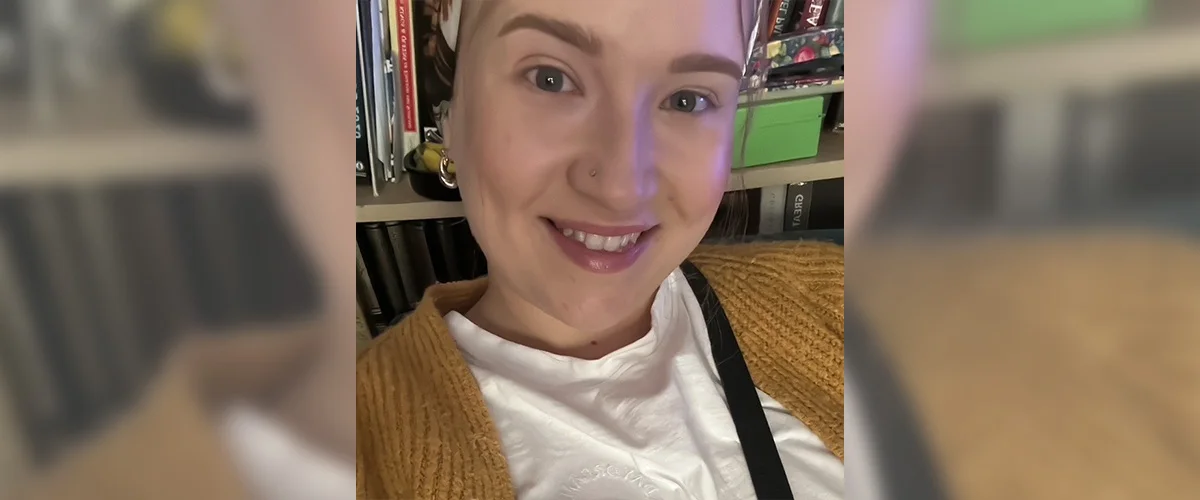An Occupational Therapist from Rolleston-on-Dove near Burton-on-Trent is sharing her story this National Eye Health Week (22 – 28 September 2025) after an eye test led to her brain tumour diagnosis.
A reminder from her optician prompted Rhiannon to book her regular eye test earlier this year.
The optician noted some unusual signs and made an urgent referral to an ophthalmologist, who ordered an MRI scan. Within weeks Rhiannon learned she had a brain tumour – a glioblastoma.
Now she’s urging anyone to visit their optician if something’s not right with their vision.
Routine eye tests are essential health checks for the prevention of poor health. In addition to identifying problems with eyesight they can also detect a range of other ailments including high blood pressure (hypertension), raised cholesterol, heart disease, brain tumours and risk of stroke.
Rhiannon’s story
For Rhiannon Ashbourne, 29, this year began like any other. She was happy with her job as an Occupational Therapist in mental health – a career she loves and finds rewarding.
Outside work, she loves to travel and explore different cultures. The last thing she expected was for a routine eye test to change everything. Rhiannon said:“I didn’t have any troubling symptoms. The appointment was just the sort of thing I’d normally schedule, to stay on top of my eye health.
“I had been dealing with pulsatile tinnitus for a while, which is a rhythmic ringing in the ears, but that didn’t seem to raise any concerns.
“And I did notice that I was finding it harder to concentrate at times, and experiencing fatigue, but I didn’t think much of it. I didn’t experience any of the more common symptoms at the time, like seizures or debilitating headaches, that people often associate with brain tumours.”
Rhiannon’s optician spotted unusual signs and suspected papilledema in both eyes, which is a build up of pressure around the optic nerve, potentially caused by a brain tumour. She made an urgent referral for Rhiannon to see an ophthalmologist within two weeks. Rhiannon said: “The ophthalmologist confirmed the presence of papilledema and ordered an MRI scan, which revealed a mass on my brain.
“Initially, my medical team suspected a low-grade glioma, but further testing and a biopsy confirmed my worst fear: a grade 4 astrocytoma, otherwise known as glioblastoma multiforme (GBM)—a high-grade and aggressive form of brain cancer that is not curable, and requires intensive treatment.

It was a huge shock, and it took me a while to process the news. I kept telling myself it wouldn’t be anything too serious, that the results would turn out fine. But the reality is, a biopsy is the only way to get a clear, accurate diagnosis. In my case, the tumour was located in an area of the brain that made it inoperable, which added another layer of difficulty to an already devastating diagnosis.
Rhiannon
“The most difficult part has been the loss of independence. I’m currently unable to work, which has been especially hard given how much I value my career. I also can’t drive—something I once took for granted. I now rely on others for support in ways I never imagined. While humbling, it has also shown me just how incredible and generous the people around me are.”
Vision and brain tumours – fast facts
- Headaches, blurry vision and double vision are some of the hallmark symptoms that can be associated with a brain tumour
- For some people, these symptoms are normal. But if they don’t disappear, get them checked out.
- One in three patients report a problem with their vision because of a brain tumour or its treatment.
- 39% of children diagnosed with a brain tumour experience sight or vision changes.
- Many employers pay for eye examinations, which are free of charge for children under 16 in full time education.
One day at a time
Understandably, coming to terms with her diagnosis has been tough, and Rhiannon says she is still processing everything.

“Some days are better than others, but I continue to push forward. Each day is a step, and I’m taking it one day at a time, finding strength in the moments that matter.
“I refuse to give in to despair. Every day is a gift, and I treasure every moment with my loved ones. Their unwavering support and love are what keep me going.
“I remain hopeful that with ongoing advancements in research into brain tumours, there will one day be a cure. I’m about to begin chemoradiation therapy, with the goal of slowing the progression of this disease and giving myself more time to live fully and meaningfully.”
Why eye tests matter
Rhiannon’s keen to raise awareness of the role opticians can play in a brain tumour diagnosis. Her advice to anyone tempted to delay their regular visit to the optician?
“Please don’t put off your eye test! Regular eye exams are essential for maintaining good vision and overall eye health. Even if you’re not experiencing noticeable issues, it’s important to have routine check-ups to catch potential problems early.
“One test that’s so important is the OCT (Optical Coherence Tomography) scan. While it may come with an extra cost, the benefits far outweigh the expense. The OCT provides detailed images of the retina and can help detect a variety of eye conditions, some of which might not show symptoms until they’ve progressed significantly. Early detection can make all the difference in preventing long-term damage and preserving your vision – and in my case it led to my brain tumour diagnosis.”
Lorcan Butler, an optometrist and dispensing optician who works as the Optical Engagement Manager at The Brain Tumour Charity, has delivered training and advice to 15,000 eye specialists between 2020 and 2025.
He said: “We are hugely grateful to Rhiannon for sharing her experience this National Eye Health Week. Several health conditions, including brain tumours, can be detected during a routine eye examination. If you, or a loved one, have any concerns about your vision please do not hesitate to contact your local optician to get reassurance and support.”
Find out more about eye tests this National Eye Health Week
Some brain tumours can be detected through an eye test. So, it’s worth making regular appointments, especially if you’re having any problems with your vision.
For more information on eye tests, click the link below:
